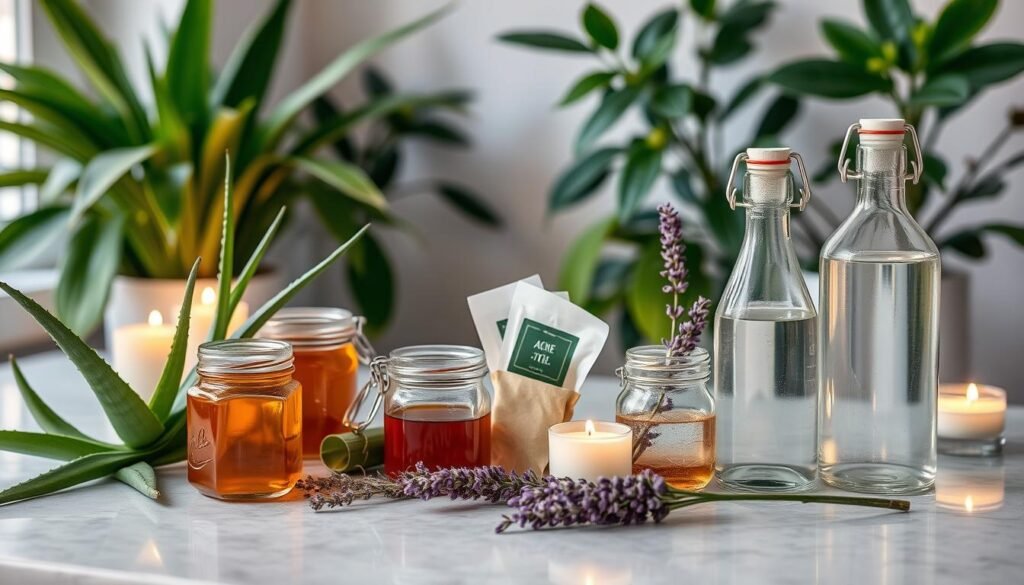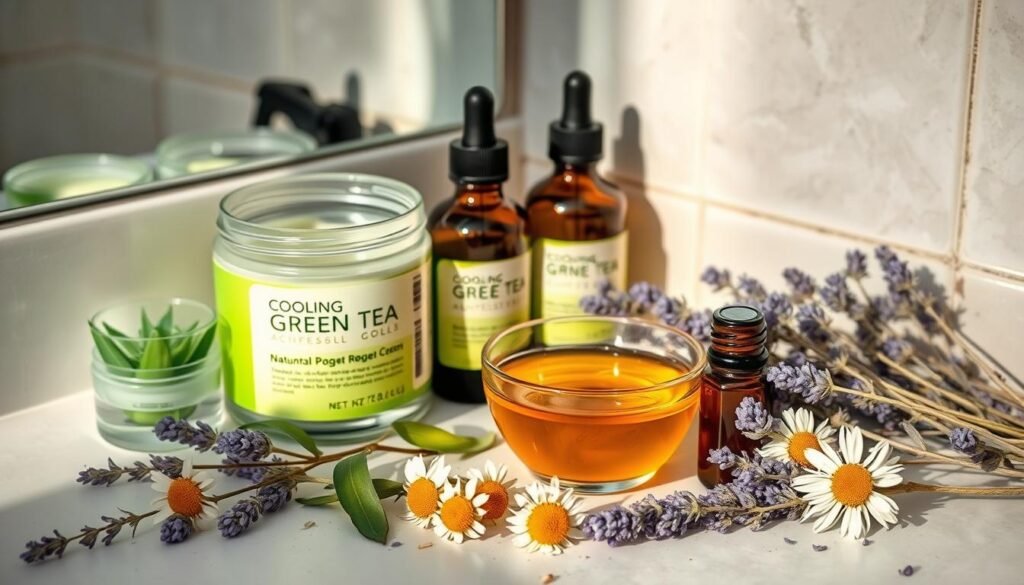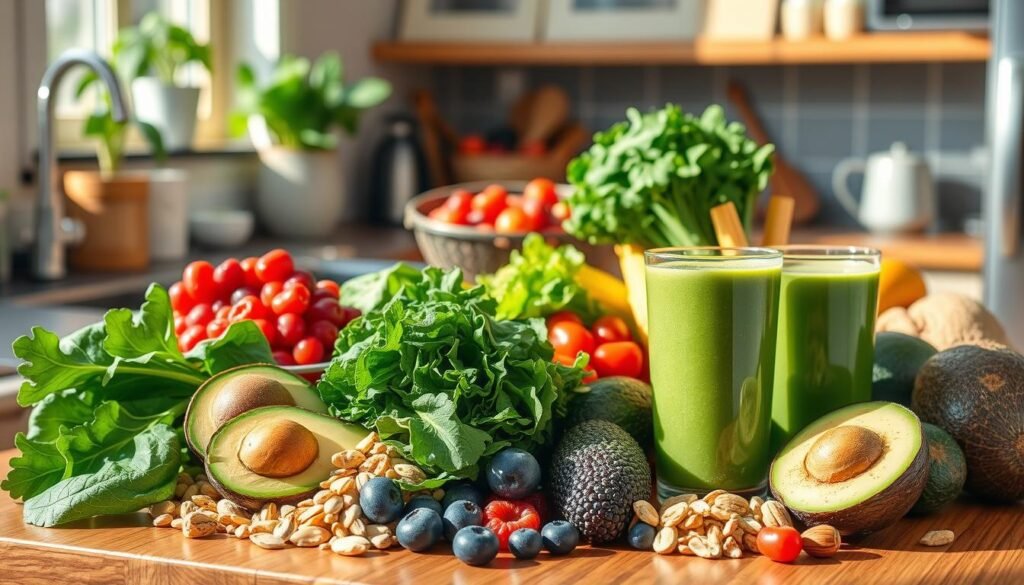Did you know that about 80% of people aged 11 to 30 get acne? This issue can cause emotional upset due to visible redness and swelling. Luckily, natural remedies are available that show good results. Options like essential oils and changes in diet can reduce acne redness, improving skin health without only using prescription treatments.
It’s important to know what causes acne to treat it well. In this article, we’ll look at natural solutions. You’ll learn about tea tree oil’s power, aloe vera’s calming effects, and how niacinamide and salicylic acid help. A skincare routine and lifestyle changes can make your skin and overall health better.
Key Takeaways
- Understanding acne is crucial for choosing the best treatment options.
- Natural remedies, including essential oils and herbal creams, can reduce inflammation.
- Incorporating ingredients like niacinamide and salicylic acid can enhance skin healing.
- Dietary changes and hydration play a significant role in managing acne symptoms.
- Establishing a gentle skincare regimen is vital for preventing future flare-ups.
Understanding Acne and Its Causes
Acne affects people of all ages, but mainly teenagers. It shows up as Acne Vulgaris, leading to whiteheads, blackheads, and cystic acne. Knowing why acne happens is key to dealing with it.
What is Acne Vulgaris?
Acne Vulgaris is a widespread type of acne. It’s caused by clogged hair follicles due to excess oil, dead skin, and bacteria. This blockage often leads to acne inflammation. If not treated, it can hurt and leave scars. The most common places for acne are the face, forehead, chest, upper back, and shoulders. Various kinds of acne include:
- Whiteheads
- Blackheads
- Papules
- Pustules
- Nodules
- Cystic lesions
Factors Leading to Inflammation
Several things trigger acne inflammation. Changes in hormones, especially during puberty or women’s menstrual cycles, are a big part. Other causes are:
- Dietary triggers like high-glycemic-index foods
- Stress, which can make inflammation worse
- Genetic factors that make acne more likely
- Some medications that can irritate the skin
- Environmental issues, like too much sweat or tight clothes
Understanding these aspects of acne Vulgaris helps people create a better care plan. It guides them to seek suitable treatments for their skin.
Natural Remedies to Soothe Redness and Inflammation
Natural remedies are a gentle way to deal with acne redness and inflammation. Many seek alternatives to harsh treatments. They turn to essential oils and herbal remedies, known for soothing the skin.
Exploring Essential Oils
Essential oils are great for skin prone to acne. For example, tea tree oil fights bacteria and reduces swelling. A study in 2017 found that 77 percent of acne patients tried alternative treatments. This shows how popular natural options are. Tea tree oil, when used on the skin, can lower inflamed spots and make skin look better.
Herbal Creams and Gels
Herbal creams and gels offer benefits for acne care. They use witch hazel, aloe vera, and green tea. Green tea extract can cut down oil production and pimples. Witch hazel might help acne when used with other skin care. Adding cucumber to treatments can boost skin hydration and ease irritation and puffiness. These natural options take a full-body approach to fight acne and improve skin health.

Home Remedies for Acne
Using natural ways can help treat acne well. Many people look for home remedies for acne that are kind without harsh chemicals. Here are some top choices known to fight acne and boost skin health.
Using Tea Tree Oil
Tea tree oil is a strong option because it fights bacteria. Studies show it can lessen acne spots. It’s liked for mild to moderate acne cases. Mix it with a carrier oil to lessen swelling and redness. Many find it as good as traditional treatments but with less side effects.
The Benefits of Aloe Vera
Aloe vera is great for acne problems. It’s a natural cleaner that soothes and heals the skin. It can ease redness and swelling too. Using the gel directly from the plant helps keep the skin healthy and repairs it.
Applying Honey Masks
Honey masks are another helpful acne solution. Though not much scientific proof, honey’s bacteria-fighting ability is known. Add things like cinnamon or lemon to boost its power. Honey lets the skin soak up its goodness, improving skin health.
Adding these home cures to your skincare routine can help manage acne better. For more natural ways, check out this resource.
Topical Treatments for Reduced Redness
Topical treatments help lessen the redness that comes with acne. They fight inflammation and boost skin clarity. Niacinamide and salicylic acid are two good choices for those with acne.
Niacinamide: A Skin Savior
Niacinamide is known for fighting inflammation. This Vitamin B3 variant strengthens the skin’s barrier and lowers redness. With regular use, it improves skin tone and texture.
Many skincare items, like serums and creams, use niacinamide to fight acne. Adding it to your daily skincare can reduce irritation and blemishes over time.
Salicylic Acid for Treatment
Salicylic acid acts as an exfoliant for acne-prone skin. It unclogs pores by going deep into the skin. This reduces acne causes, inflammation, and redness.
Incorporating it in treatments improves skin clarity. However, users should monitor for any dryness or irritation from overuse.

Use of Natural Oils in Skin Care
Natural oils are becoming popular in skin care, especially for acne sufferers. They include oils like argan and jojoba. These oils hydrate the skin and help control acne symptoms. They are vital for a good skincare routine.
Argan Oil and Its Hydration Properties
Argan oil is loved for its hydration properties. It’s full of fatty acids and vitamin E, nourishing the skin without blocking pores. Besides hydrating, argan oil helps reduce acne scars for smoother skin.
Jojoba Oil for Reducing Inflammation
Jojoba oil is great for those with acne. It acts like the skin’s own oils, balancing oil production. This quality makes jojoba oil good for easing inflammation and preventing acne. It also helps make the skin healthier and stronger.
| Natural Oil | Benefits | Best For | Application Method |
|---|---|---|---|
| Argan Oil | Hydration, minimizes acne scars | Dry, sensitive skin | Topical application, massage |
| Jojoba Oil | Reduces inflammation, balances oil | Oily, acne-prone skin | Topical application, mixing in creams |
Using natural oils can make skin care simpler and clearer. With regular use, you can see many benefits.
Dietary Changes to Combat Acne Symptoms
Nutrition plays a key role in controlling acne symptoms. By changing our diets, we can fight for clearer skin. Staying hydrated benefits overall health and specifically helps our skin. It keeps our skin elastic and may stop breakouts.
Importance of Hydration
Drinking enough water each day is crucial. It helps to remove toxins and keeps our skin working well. Hydration keeps our skin barrier healthy, stopping acne from getting worse. Experts suggest drinking at least eight glasses of water daily for better skin texture.
Role of Anti-Inflammatory Foods
Eating foods that fight inflammation helps with acne too. Fatty fish, chia seeds, and walnuts are great because they’re full of omega-3 fatty acids. This helps lower inflammation. Plus, eating lots of fruits and veggies gives us vital nutrients and antioxidants. These fight the stress on our skin that causes acne.
Studies show that a low-glycemic-index diet can help control acne. Eating whole foods and less dairy and sugar is good for our skin. Also, trying dairy alternatives might help people with acne-prone skin.
| Food Type | Benefits |
|---|---|
| Fatty Fish (e.g., Salmon) | Rich in omega-3s, reducing inflammation. |
| Chia Seeds | High in fiber, omega-3 fatty acids, and antioxidants. |
| Fruits (e.g., Berries) | Antioxidant-rich, combat oxidative stress. |
| Leafy Greens | Loaded with vitamins and minerals to support overall skin health. |

Establishing a Gentle Skin Care Routine
A proper skin care routine for acne is crucial. It helps manage redness and swelling. Gentle cleansers are key, cleansing the skin without irritation. They remove dirt yet keep the skin’s moisture balance.
Choosing the Right Cleanser
Finding the right cleanser is the first step. It’s important to choose non-comedogenic, gentle cleansers. These don’t take away the skin’s natural oils. Cleansers like the Neutrogena Fragrance-Free Ultra Gentle Foaming Daily and CeraVe Acne Foaming Cream Cleanser are great options. They have ingredients like 4% benzoyl peroxide, fighting acne while being gentle. Use them twice daily to control oil and prevent breakouts.
Moisturizing and Its Importance
Moisturizing is vital for acne-prone skin. It needs hydration to stay healthy. Choose lightweight, hypoallergenic moisturizers to keep skin nourished without clogging pores. Products like PM Facial Moisturizing Lotion come with beneficial ingredients like ceramides and niacinamide. Moreover, options like Cetaphil Derma Control Oil Absorbing Moisturizer have SPF 30. They protect against the sun while helping control oil.
Sun protection is essential in acne skin care. Some might forget about this step. But using a moisturizer with SPF, like EltaMD UV Clear Broad Spectrum SPF 46, is key. It protects the skin and helps prevent inflammation.
| Product | Key Ingredient | Benefits |
|---|---|---|
| Neutrogena Fragrance-Free Ultra Gentle Foaming Daily Cleanser | Gentle formula | Removes dirt and oil without irritation |
| CeraVe Acne Foaming Cream Cleanser | 4% Benzoyl Peroxide | Targets acne and cleanses effectively |
| PM Facial Moisturizing Lotion | Niacinamide, Ceramides | Hydrates and restores skin balance |
| Cetaphil Derma Control Moisturizer SPF 30 | Sunscreen, Lightweight | Prevents UV damage, balances oil production |
Starting a gentle skin care routine for acne starts with understanding your skin. Tailoring your routine boosts treatment success. It promotes long-term skin health and reduces future breakouts.
Lifestyle Changes for Acne Management
Making smart changes in your lifestyle can greatly help control acne. Stress is a big reason acne gets worse. It causes hormone levels to go out of balance. This can make your skin produce more oil and become inflamed. So, finding ways to relax is crucial.
Practicing mindfulness, exercising regularly, and spending time with friends can help. These activities improve your overall well-being. Plus, they help keep acne breakouts under control.
Reducing Stress Levels
Trying different ways to lower stress can aid in acne control. Doing yoga, meditating, or walking outdoors can help you relax. These activities lower cortisol, a stress hormone, which is good for your skin.
Taking steps to decrease stress can balance your hormones. This leads to clearer skin. It also reduces the chance of getting the inflammation that causes acne.
The Importance of Good Sleep
Good sleep is key for managing acne too. Sleep lets your body fix itself, including your skin. Not getting enough sleep can make skin problems worse.
Getting enough rest is crucial for your health and helps your skin repair itself. Stick to a regular sleep routine and make sure your sleeping space is calm. Doing so can really improve how you manage acne.